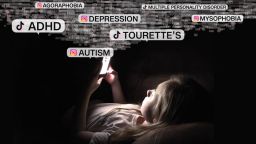Editor’s note: If you or someone you know is struggling with mental health, help is available. Dial or text 988 or visit?988lifeline.org?for free and confidential support.
Attention deficit hyperactivity disorder is associated with a higher incidence of depression, anorexia or post-traumatic stress disorder as well as the risk of suicide attempts, a new study found. A neurodevelopmental condition, ADHD is a pattern of hyperactivity, inattention and impulsive behavior that interferes with daily functioning or development.
People with ADHD were 30% more likely to attempt suicide and 9% more likely to develop major depression, according to the study, which could only show associations and not prove a direct cause and effect. Once those with ADHD developed depression, they were then 42% more likely to try to take their own life.
“ADHD and suicidal behavior share common genetic factors that may reflect genetic variants associated with impulsivity, a trait that is highly heritable,” said lead study author Dr. Dennis Freuer, a statistician and chair of epidemiology at the University of Augsburg in Germany.
“Impulsivity is a core component of ADHD and closely associated with suicidal behavior. Our study suggests that both ADHD and major depressive disorder are risk factors for suicide attempt,” Freuer said in an email.
Living with ADHD was also associated with an 18% higher chance of developing PTSD after a trauma. If the person had both ADHD and depression, the risk of PTSD rose by 67%.
HOW TO GET HELP
- The?Substance Abuse and Mental Health Services Administration, or SAMHSA, has a national helpline: 800-662-HELP (4357). It provides free, confidential treatment referral and information in English and Spanish 24/7.
- The?American Psychological Association?has a webpage of resources if you’re struggling with suicide, substance abuse or domestic violence. If the situation is potentially life-threatening, get immediate emergency help by calling 911.
- The?International Association for Suicide Prevention?and?Befrienders Worldwide?also provide contact information for crisis centers around the world.
Eating disorders linked to ADHD
The study also found a direct link between ADHD and anorexia nervosa, an eating disorder characterized by a distorted body image, an intense fear of weight gain and a dangerously low body weight. People with the condition go to extremes to avoid putting on pounds, including “vomiting after eating or by misusing laxatives, diet aids, diuretics or enemas, according to the Mayo Clinic website.
However, “anorexia isn’t really about food,” Mayo noted. “It’s an extremely unhealthy and sometimes life-threatening way to try to cope with emotional problems. When you have anorexia, you often equate thinness with self-worth.”
Unlike the study’s findings on suicide and PTSD, the new research did not show an association between major depression and the development of anorexia. Instead, “the increased risk for anorexia nervosa can be attributed entirely to ADHD,” Freuer said.
Why would that be? Because the two conditions share “neurocognitive deficits” that center around a lack of impulse control, Freuer said.
“Impulsivity, for example, is a hallmark symptom of ADHD, and is largely thought to arise from abnormalities in neural pathways of the brain that govern reward and impulse inhibition,” said ADHD clinician Dr. James Greenblatt, chief medical officer at Walden Behavioral Care in Waltham, Massachusetts, in an email. He was not involved in the study.
Overall, the new study’s results were not surprising, as it’s well known that ADHD is frequently associated with other mental illnesses, said Greenblatt, who has written books on personalizing treatment for children with ADHD, binge eating, food addiction and more. However, he added, a diagnosis of ADHD does not “guarantee” specific future outcomes.
“Having ADHD does not make depression (or other mental disorders) inevitable. What it does do, however, is ‘stack’ the deck of cards we’re dealt — cards like genetics, biochemistry, lifestyle, environment, and psychology — in such a way as makes certain outcomes such as depression more likely,” he said.
Using genes to establish risk
The study, published Tuesday in the journal BMJ Mental Health, used a statistical method called Mendelian randomization, which uses “genetic variation to assess how — and how significantly — a given risk factor may influence a health outcome,” Greenblatt said.
Researchers looked for a link between ADHD and seven mental health conditions: anorexia nervosa, anxiety, bipolar disorder, major depression, PTSD, schizophrenia and at least one suicide attempt.

While the research discovered a direct link between ADHD and the development of major depressive disorder and found that both ADHD and major depressive disorder “separately and jointly” contributed to PTSD and suicide attempts, that was not the case for other chronic mental health conditions, according to Freuer. “There was no evidence for a causal link between ADHD and bipolar disorders, anxiety (or) schizophrenia,” he said.
The lack of a finding on anxiety is unusual, as “up to 2/3 of children with ADHD have at least one other comorbid condition — anxiety is the most common,” Greenblatt said.
“Also on the list are Tourette syndrome, obsessive compulsive disorder, depression, substance use disorders, eating disorders, learning disabilities and sleep dysfunction,” he added.
Genes are only one part of the puzzle
Genetics play a role in which diseases or conditions an individual develops, but the environment plays a huge role in whether those genes are expressed, Greenblatt said.
“Two kids can have the disorder, and one has a family and school environment that’s really supportive and the other child could be criticized, stressed out and constantly feeling put down at home and the school has no accommodations,” he said.
Both children have the same biological disorder — ADHD — but different environments will uncover different symptoms such as anxiety or depression, Greenblatt said.
“To me the punchline of the study is, ‘OK, now we have the genetic link to go along with what we know from observation. What are we going to do with it? As a clinician, it reinforces the need to diagnose and comprehensively treat ADHD in kids and adults.”
Because ADHD is typically diagnosed in childhood, the study’s results could be used by clinicians to do early screenings for signs of depression, suicidal ideation or anorexia, Freuer said.
“This would allow for early treatment tailored to the patient, he said. “From a personal and family point of view, I think it is important not to underestimate any symptoms and the disease itself and its possible consequences and to seek professional help in time.”



